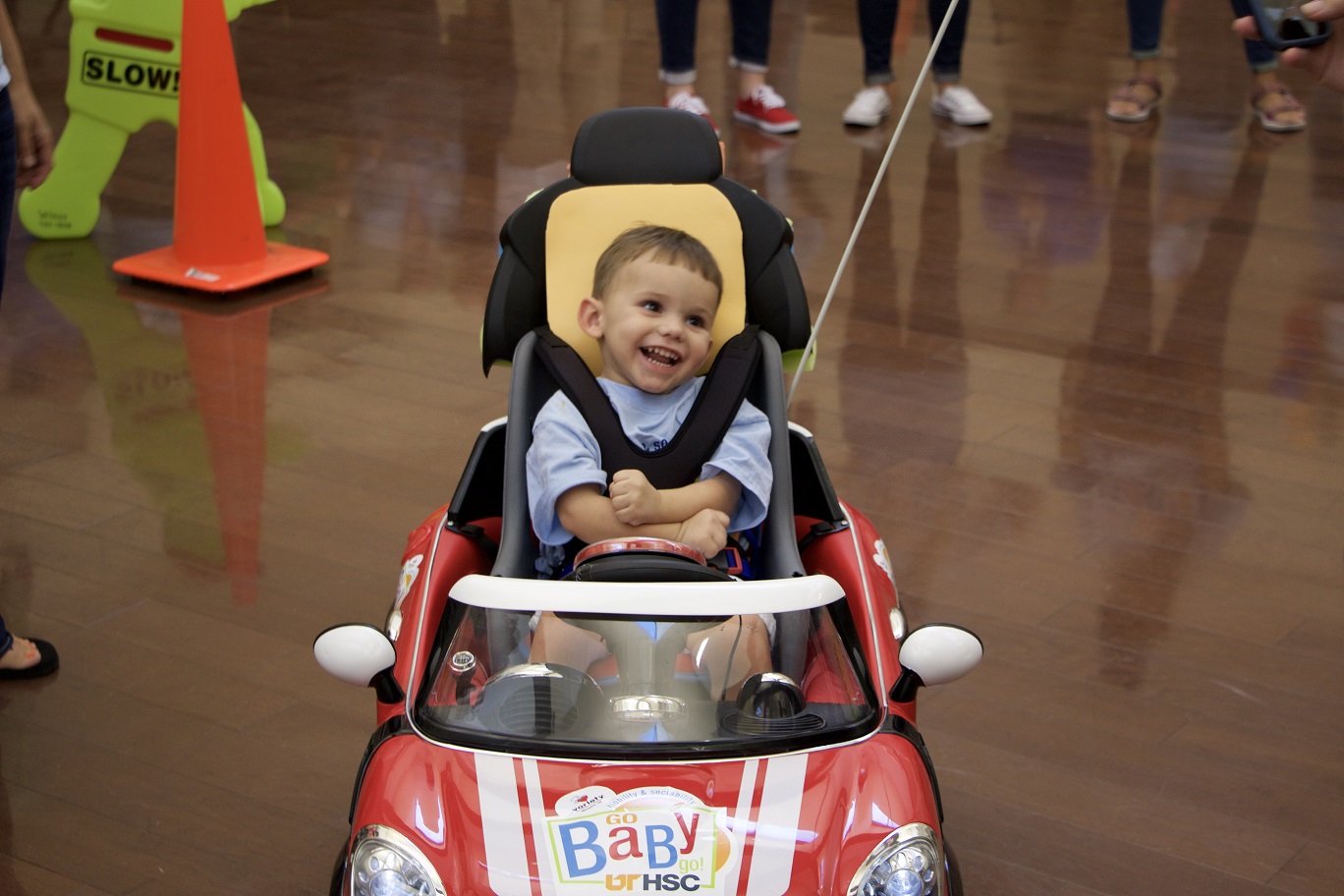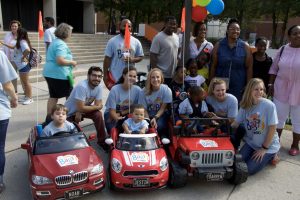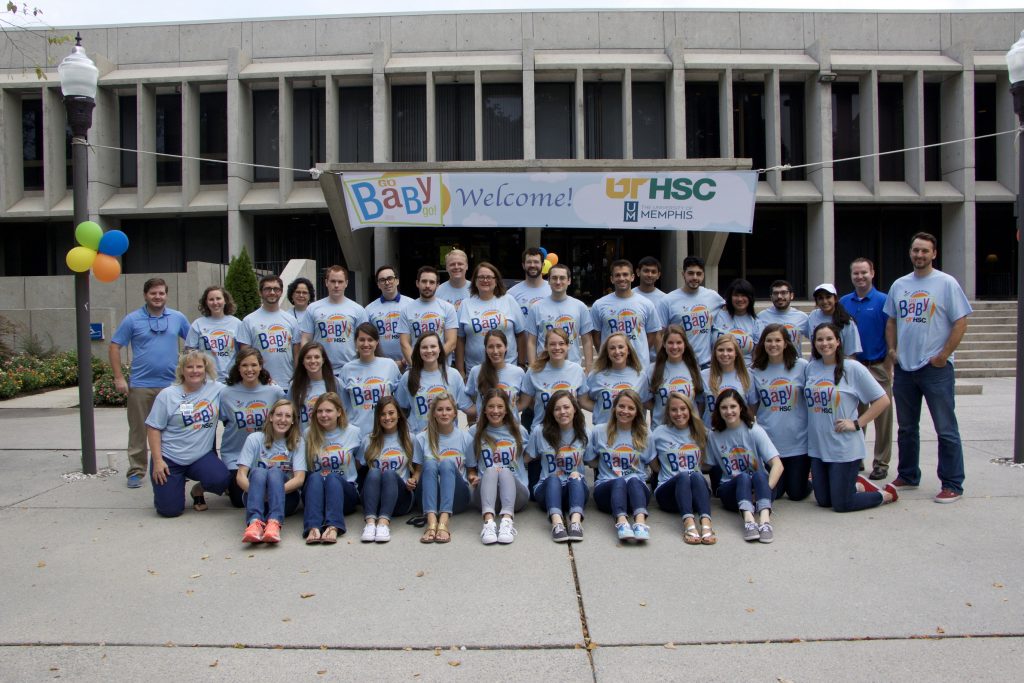
When Steven Reeves saw a ride-on Power Wheels dump truck last Christmas at Toys “R” Us, he tried to figure out how to rig up a safety harness so his son, Noah, 2, who has hypotonia or muscular weakness, could sit up in it and operate it.
Reeves couldn’t do it. But students in the Physical Therapy (PT) Department at the University of Tennessee Health Science Center, working with engineering students from the University of Memphis, could.
On Saturday, Sept. 10, Noah was one of a dozen children ages 13 months to 4 years old, who got to drive and take home shiny new ride-on toy cars modified to fit their special needs. The cars were part of the first-ever GoBabyGo! Memphis project presented by the first-year PT students under the direction of Roberta “Bertie” Gatlin, PT, ScD, PCS, assistant professor and admissions chair in the PT Department in the College of Health Professions.
“It’s awesome what they’ve done,” said Reeves, a material handler at a factory in Ripley, Tennessee, as he waited for Noah to get his car. His family and others began arriving before 9 a.m. at the UTHSC Student-Alumni Center, where each child’s car awaited a final fit before it could be taken out for a spin and then taken home.
Push-button controls had been added for those unable to operate switches, support structures were designed for those who can’t sit up, voice- or head-controls helped those who lack hand mobility.
Memphian Tim Quinn waited with his son, Charles, 4, to get the finishing touches on the bright red Jeep the boy would take home. Charles, who has anoxic encephalopathy from a near-drowning accident two years ago, can’t speak or walk.
“This is great for kids his age,” the elder Quinn said. “When you don’t have use of your arms and legs, there is no going around. Hopefully, this will give him a sense of his own mobility.”
The national GoBabyGo! program was launched in 2006 at the University of Delaware by Cole Galloway, PhD, FAPTA, as a way to help children with mobility issues move, play, socialize and have fun like their peers. More than 50 universities have hosted events similar to the one at UTHSC. Out-of-the-box toy cars are modified for GoBabyGo!, so that the children can use them.
Dr. Gatlin said she initiated the GoBabyGo! Memphis event at UTHSC for several reasons. She hopes to give PT students early experience in project planning and in working with children with mobility issues. She also wants to help the children and families access something they never thought they could use. “These kids don’t have an opportunity to go out and purchase a power car,” she said. “They can’t just go to Babies “R” Us and buy one, because the cars need modifications.”

Work on the project began months ago, as the children were chosen through referral from community therapists and assessed to make sure they were able to understand simple instructions necessary for safely operating a toy vehicle once modified. The PT students met with the children several times to determine what modifications were necessary for each child. Several building sessions were held, when the cars were assembled and the modifications for postural needs, power manipulation and any other safety accommodations were made. The engineering students from UofM provided adaptive design expertise.
Permobil, a provider of power wheelchairs and mobility products, donated all the adaptive switches, electrical circuit wiring and various forms of equipment for the cars. Numotion, also a provider of custom wheelchairs and assistive products, partnered with Permobil to provide adaptive joysticks, head controls, support straps, seatbelts and other modifications. Because each car costs $500 to $800 to complete, project organizers also solicited donations to support the event, as well as sponsorships for individual cars.
Variety Children’s Charities designated it a signature event, contributing funds to help purchase the cars. “I am amazed that the students have been so enthused to do this project,” said Kathy Hallmann, president of Variety Children’s Charities, who attended the event. “The families are excited. We as a board, as a charity, are thrilled to be a part of this.”

The children were placed in their cars, and all were able to drive them around before taking them home. Dr. Gatlin said her goal for GoBabyGo! Memphis is to continue it as an annual project for UTHSC’s first-year PT students, with guidance and direction from the second-year students gained from putting it on the previous year.
PT student Julia Stonebrook of Memphis, one of the organizers of the event, surveyed the room as things were underway. The morning was “like a dream” for the student, who said she has wanted to be a physical therapist since high school.
“It means being able to give kids with special needs the ability to explore on their own, because before now, they haven’t been able to do that,” she said. “What kid doesn’t want to play? It just means the world to these kids and these families, and it’s cool to be a part of it.”

